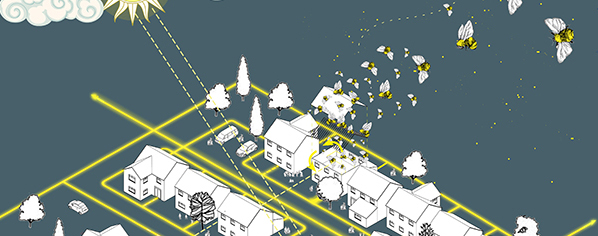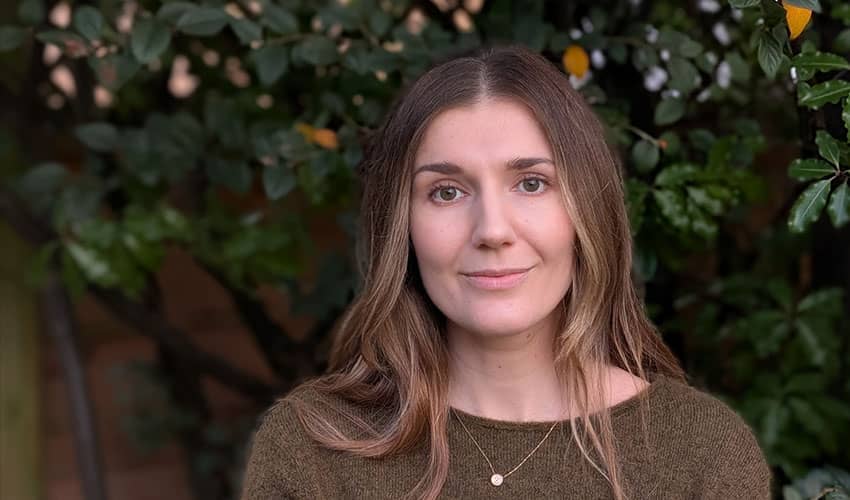Bee behaviour to influence energy efficiency communication to homes

A revolutionary project launching in December 2021 is set to redefine how households are advised on the most efficient use of their energy, based on bees’ social organisation and communication patterns.
A team of multidisciplinary researchers led by Associate Professor Sonja Oliveira with Dr Chatzimichali, Dr Badarnah, Dr Barakat (UWE Bristol) and Dr Atkins (University of Bristol) will first study household patterns around their and their community’s energy usage. They will then develop an algorithm conceived by looking at how bees best communicate resource needs to each other through their environment. This algorithm will help come up with the most effective way to communicate with households.
Currently many individuals or families living in homes benefit from smart meters or other smart devices that advise them on how to use their energy in the most efficient way possible, based on their usage. However, research has shown that this guidance does not effectively communicate people’s energy use at different scales.
Sonja Oliveira, who is an Associate Professor for architecture and sustainability design innovation, and is leading the project, said: “As the world moves towards everything depending on electricity, including transport, we need a better way to communicate collective needs to individual households at localised levels.
“At the moment energy use communication is managed with no social or environmental behavioural data. We are saying that optimum energy use is determined by and affects the local neighbourhood and that it’s a multi-dimensional thing. What might work, therefore, is to tell people what impact their energy use might be having on their immediate environment.”
The project, entitled ‘Glow-energy nested bio system flows from the home to hub’, is to initially last two and half years and has successfully obtained EPSRC funding of £586,000. The team will monitor electricity usage and energy behaviour from volunteers living across three low carbon new build housing communities in the South West and Wales, who will feed back information via interviews and submit photographic evidence of their daily energy routines.
The researchers will also assess information about the home, its orientation, types of windows and roof, as well as how the street and neighbourhood are configured.
The team will then use their computational and biomimetic expertise to draw on this social data map and turn it into an algorithm. Once the optimal form of bee communication is established, this will be translated into a form of communication for human users of energy in their homes.
“We are going to study how bees use resources to meet collective needs. As they move through space, they pick up environmental data, and pollen and are known to communicate very effectively. The idea is to use that communication protocol and adjust it for human behaviour.”
The team, made up of biology, energy and biomimetics experts, architects, as well as human geography, will then call on the opinion of the wider public who, via an app, will share their views on whether they think the system works. This feedback will enable the researchers to try and understand whether, when accessing this new communication method, people are subsequently likely change to their behaviour when it comes to energy use.
Later on, a form of technology, either an app or another smart system is to be developed to relay this accurate information to energy consumers.
Related news

16 February 2026
UWE Bristol researchers awarded grant to explore impact of asset recovery on offenders
UWE Bristol academics have been awarded funding to explore of the impact of asset recovery on deterring offender behaviour and disrupting crime networks.

10 February 2026
Work by UWE Bristol lecturer features in Government’s National Cancer Plan
Work by a UWE Bristol academic has been included in the Government’s National Cancer Plan.

23 January 2026
On-demand minibus services beneficial in rural areas but face financial challenges, trials suggest
Trials of ‘demand responsive transport’ minibus services boosted connectivity for people in rural and suburban areas, according to a new report produced by UWE Bristol researchers.

18 December 2025
UWE Bristol professor appointed National Institute for Health and Care Excellence CEO
Jonathan Benger CBE, Professor of Emergency Care at UWE Bristol, has been appointed as the new chief executive officer of the National Institute for Health and Care Excellence (NICE).

17 December 2025
Findings revealed from first UK study into experiences of mothers who are survivors of rape pregnancy
UWE Bristol academics have revealed the findings of the first UK-based study of the experiences of mothers who are survivors of rape pregnancy.

11 December 2025
Social media influencer work is far more demanding than it looks, research finds
A study exploring the mental health impacts of social media influencer work has revealed that life online is far more demanding than it appears.

25 November 2025
UWE Bristol experts join film Q&A exploring music and melodrama
Academics will take part in the Cary Comes Home Festival, with a post-screening Q&A exploring music, melodrama and emotional storytelling in classic cinema.

17 November 2025
Urgent reform needed to support ambulance-delivered end of life care, study finds
More than three quarters (78 per cent) of paramedics sometimes fear doing the wrong thing when caring for people in the last year of life, new research has found.

13 November 2025
Bristol’s screen industry experiences “boom-and-bust cycle” after post-pandemic recovery, new research from UWE Bristol finds
New research from UWE Bristol provides detailed insight into Bristol's screen sector.

13 November 2025
New AI research to revolutionise animal welfare
A UWE Bristol research project will combine behavioural science and AI to create technology that understands not only what animals do, but how they feel.

10 November 2025
Lessons from Low Traffic Neighbourhoods will drive better public engagement, study finds
Lessons from Low Traffic Neighbourhoods have informed a new toolkit to improve engagement with the public on challenging local street issues.

06 November 2025
First-of-its-kind study aims to help more people spend their final days at home
A new study will explore how architectural design could support end-of-life care in domestic settings.






